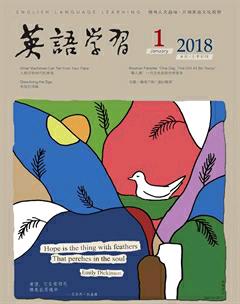亨利和山田圭子
By+Jamie+Ford

《悲喜边缘的旅馆》(Hotel on the Corner of Bitter and Sweet)是美国著名华裔作家杰米·福特(Jamie Ford)于2009年创作的第一本小说,也是获得最多好评的小说。
华裔男孩亨利·李(Henry Lee)和其日裔女孩山田圭子(Keiko)是雷尼尔学校仅有的两名非白人学生,于是他们很快结识并成为知心好友。但Henry的父亲反对他们交往,导致两人失去了联系。这个故事衬托出战争对个体命运,尤其是生活在异国他乡的移民的影响。面对历史大背景,个体是多么的无助无奈和卑微。Keiko一家对美国人和中国人并没有敌意,但因日本跟美国和中国交战,Henry的爸爸不惜用断绝父子关系来阻止两人的交往。小说的背景是1986年步入中年的Henry回忆他与Keiko之间那段难以忘怀的情感经历。
这篇节选里讲述了圭子与她的父母邀请亨利与他们共进午餐。在谈话时,圭子妈妈注意到了亨利的大红色别针——上面写着“我是中国人”。因珍珠港事件,在美国的日本人受到排挤,亨利爸爸一直要求亨利随时随地佩戴这枚别针以避免被别人误认为是日本人。作者通过在此章的开头和结尾都描写这个别针来强调二战时期对于中国人这个身份的认知。
Within a week, the evacuation(疏散,撤离)of Bainbridge Island was already old news—within a month it was almost forgotten, on the surface, anyway—everyone was doing their best to go about business as usual. Even Henry felt the restless calm as he and Keiko made plans for lunch on Saturday. She had surprised him by calling his home. Henrys father had answered the phone. As soon as she spoke in English, he handed the receiver to Henry. His father didnt ask who it was, just asked if it was a girl—knowing full well the answer.
I guess he just wanted to hear it from my lips, thought Henry. “Yes, its a girl” was all he offered. The words came out in meaningless English, but he nodded and explained, “Shes my friend.” His father looked confused, yet seemingly resigned to the fact that his son was practically in his teens. Back in China, the Old Country, marriages happened as early as thirteen or fourteen. Sometimes they were arranged at birth, but only for the very poor or the very rich.
His father would probably be more concerned if he knew the purpose of the call—to meet Keikos family. No, Henry realized, concerned was too gentle a word, his father would be livid(怒不可遏的).
Henry, on the other hand, was less worried until he realized that lunch might qualify as a date—a thought that made his stomach churn(翻滾)and his palms sweat. He reassured himself that it was nothing fancy, just lunch with the Okabes(Keiko的父母).
At school, things seemed abnormally normal—so restrained(受约束的)and peaceful that he and Keiko didnt know what to think. The other children, and even the teachers, seemed unaware of the Japanese exodus(大批的离去)from Bainbridge Island. The day had come and gone in relative quiet. Almost like it never happened. Lost in the news of the war—that the U.S. and Filipino(菲律宾的)troops were losing at Bataan(巴丹半岛)and that a Japanese submarine had shelled(轰炸)an oil refinery(炼油厂)somewhere in California.
Henrys father had become more adamant(固执的)than ever that Henry wear his button(圆形小徽章). “On the outside—wear it on the outside, where everyone can see it!” his father demanded in Cantonese as Henry was heading out the door.endprint
Henry unzipped his coat and left it open so the button was plainly visible, slumping(耷拉着)his shoulders, awaiting his fathers stern approval. He had never seen his father so serious before. His parents even went one step further, each wearing an identical button. Some sort of collective effort, Henry reasoned. He understood his parents concern for his own wellbeing, but there was no way that theyd be mistaken for Japanese—because they rarely left Chinatown. And if they did, there were simply too many people to round up in Seattle. Thousands.
Henry and Keikos plan was to meet in front of the Panama Hotel. It had been built thirty year earlier by Sabro Ozasa—some architect that Henrys father had mentioned once or twice. Japanese, but of some renown(名望), according to Henrys father anyway, who rarely acknowledged anything in Japanese community in a positive light. This being the rare exception.
The hotel was the most impressive building in Nihonmachi(日本街), or the entire district for that matter. Standing as a sentinel(哨兵)between two district communities, it provided a comfortable home for people fresh off the boats(刚从国外回来的), rooming by the week, or the month, or as long as it took to find a job, to save a little money, and to become an American. Henry wondered how many immigrants had rested their weary heads at the Panama Hotel, dreaming of a new life that began the day they stepped off the steamship from Canton(广州)or Okinawa(冲绳), counting the days until they could send for their families. Days that usually turned to years.
Now the hotel stood as a run-down(破舊的)shell of its former glory. Immigrants, fishermen, and cannery(罐头厂)workers who werent allowed to bring their families with them from the Old Country used it as a permanent bachelor hotel.
Henry had always wanted to go down to the lower level. To see the two marble bathhouses, the sento(公共澡堂), Keiko called them. They were supposedly the largest and most luxurious on the West Coast. But he was too scared.
Almost as scared as he was to tell his parent he was meeting Keiko. Hed hinted to his mother—in English no less—that he had a Japanese friend, and she had immediately shot him her stink-eye(白眼), a look of shock so profound(深厚的)he immediately dropped the subject. Most Chinese parents were indifferent to the Japanese, or the Filipinos who were arriving daily, fleeing the war or seeking better fortunes in America. Some Chinese harbored(怀有)ill feelings, but most simply kept to themselves. His parents were different—they checked his shirt for an “I am Chinese” button every time he walked out the door. Fathers nationalistic(民族主义的)pride, his banner of protection, just kept swelling.endprint

